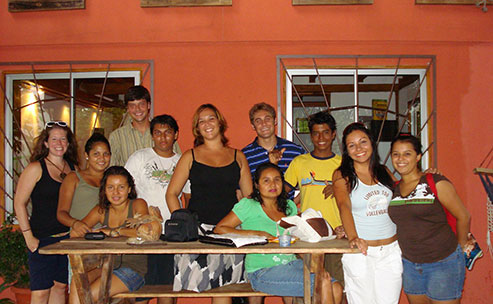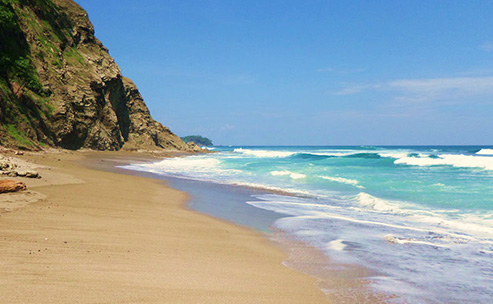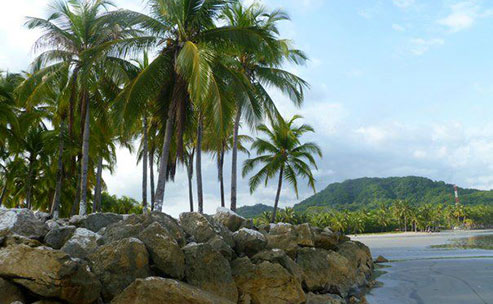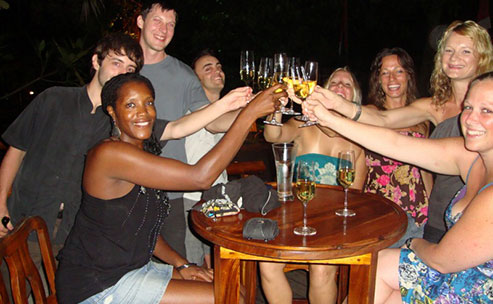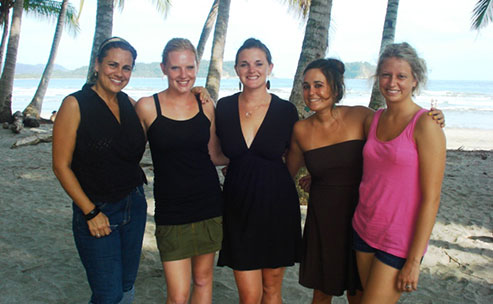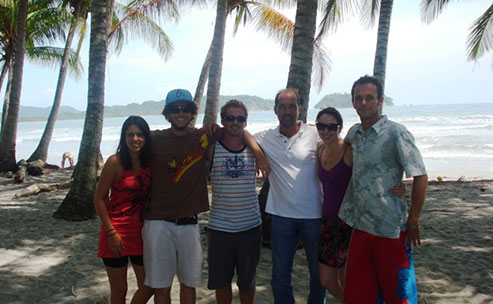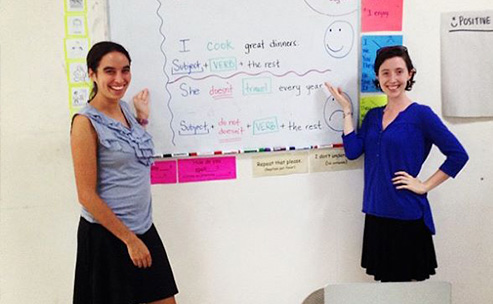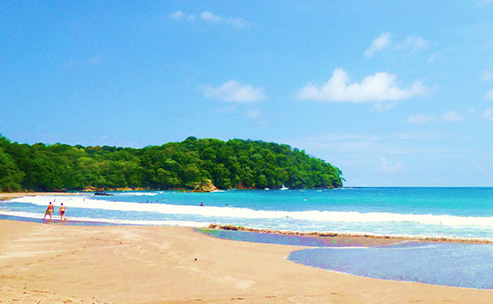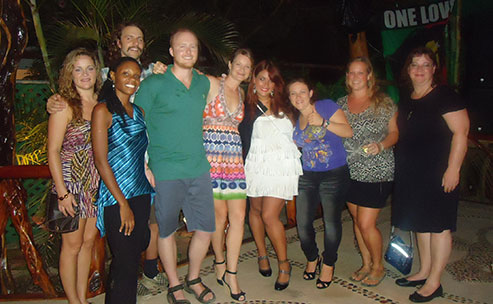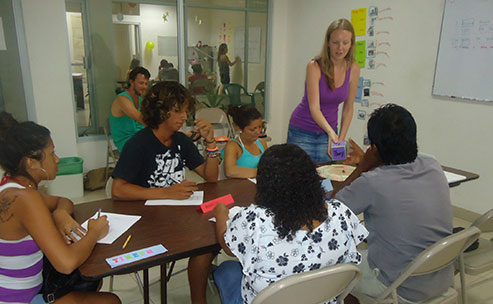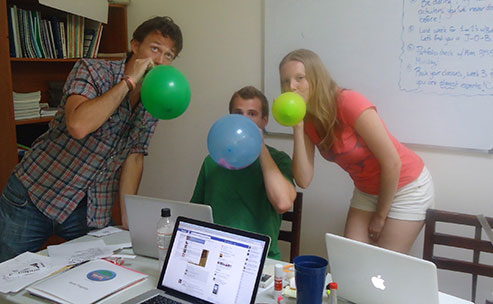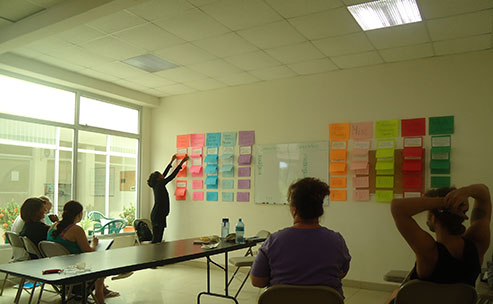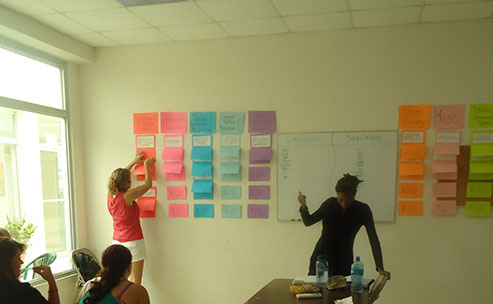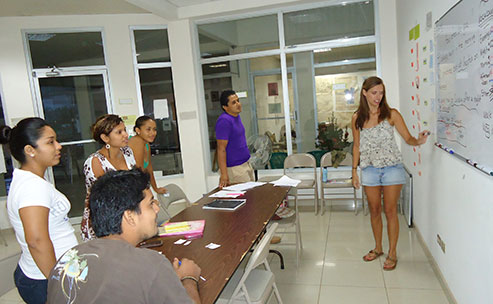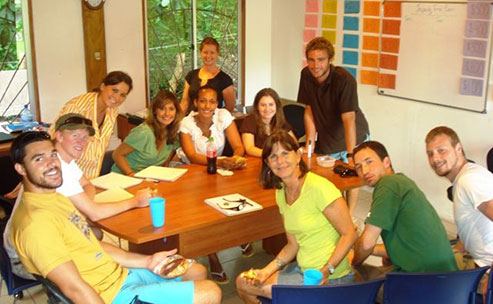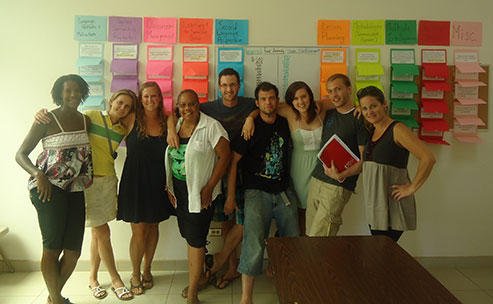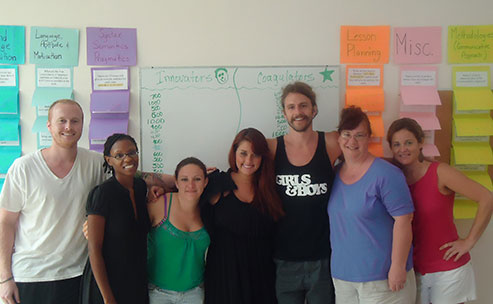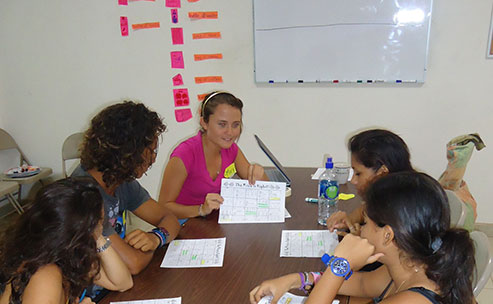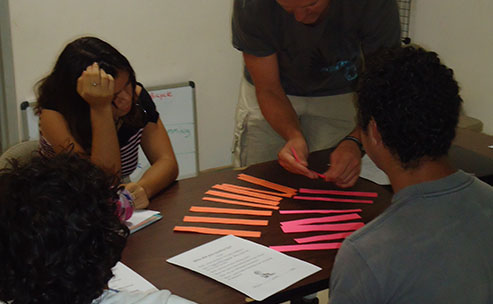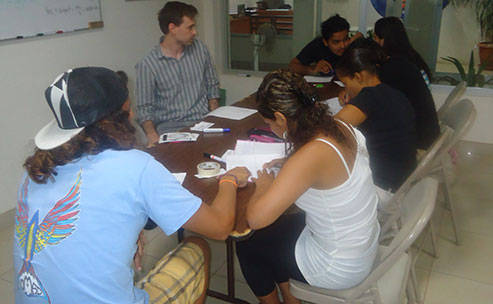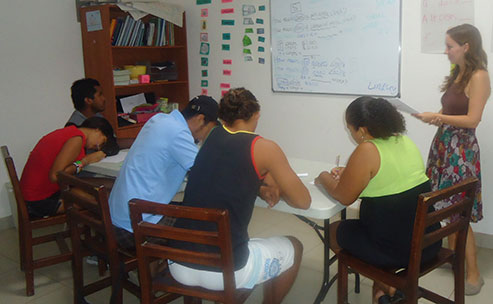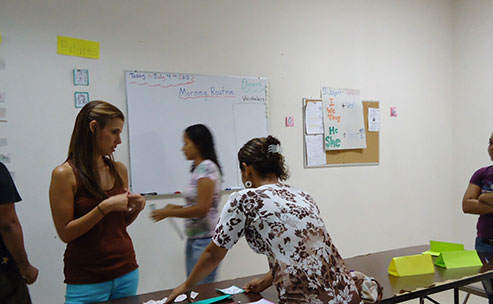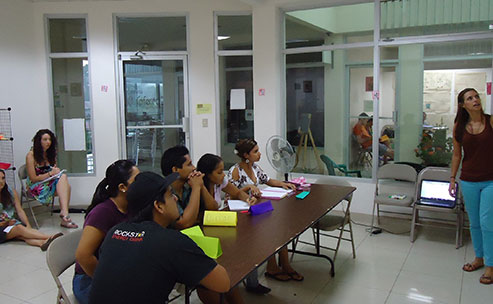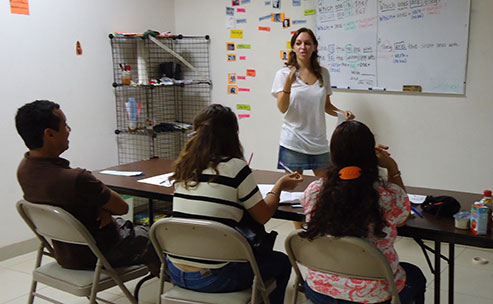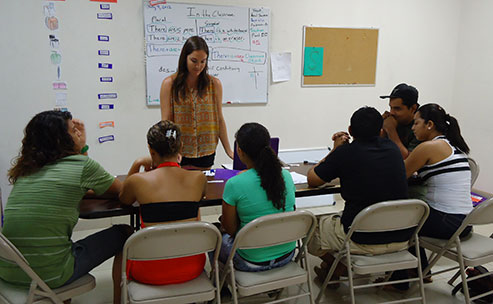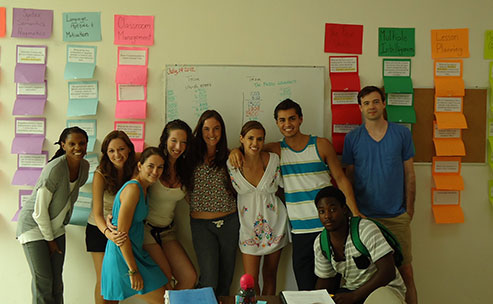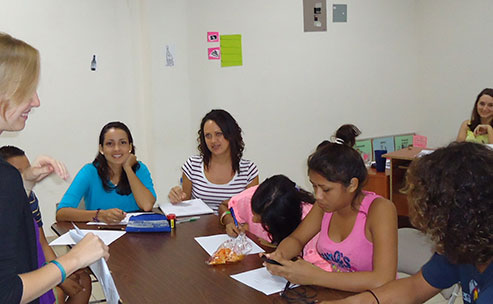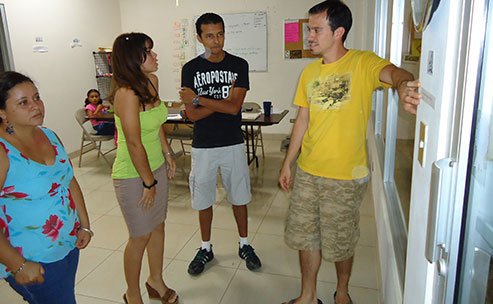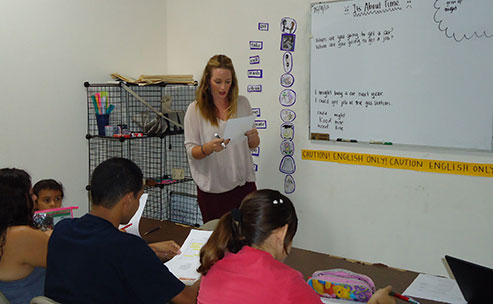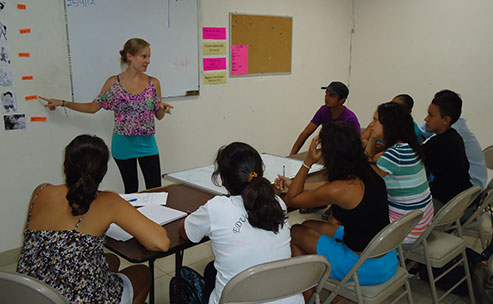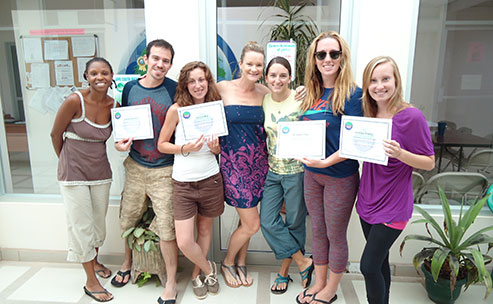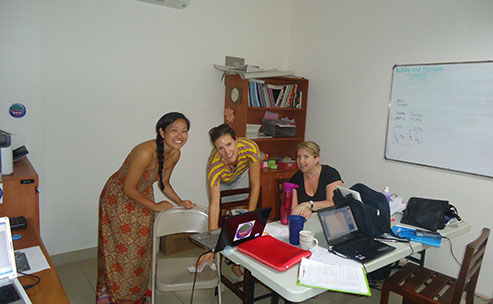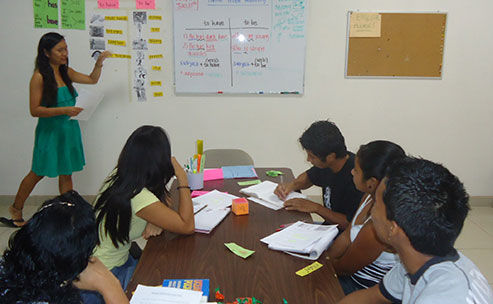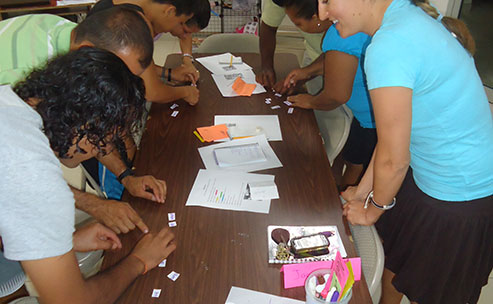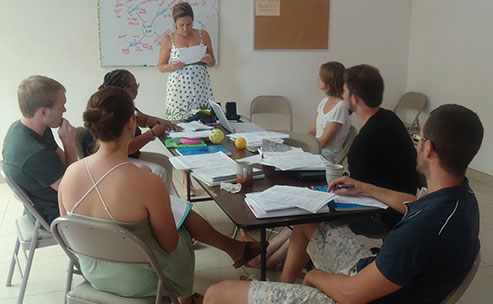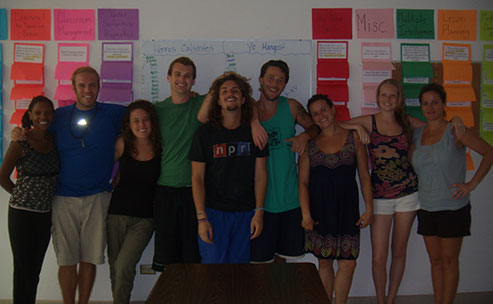Why get certified?
Broadening horizons by traveling overseas is an idea that appeals to a wide range of people: students looking to fill a gap year, professionals yearning for a career change, recent graduates stifled by the lack of job opportunities. The challenge for many becomes finding a way to travel with a purpose, to contribute to a local community and experience what the average tourist cannot. Our certification offers a unique opportunity to earn a living while residing abroad and to become an active member of a foreign community.
Why Playa Samara?
There is no better place to get certified than in a beautiful beach town like Playa Samara, which is foreign friendly while still maintaining the rich culture of Costa Ricans and exemplifying the pura vida lifestyle. In addition to our internationally recognized school, Playa Samara boasts plentiful opportunities to learn and practice Spanish, delicious international cuisine, and a variety of touring options to appeal to every type of traveler.
Do you provide housing assistance in Playa Samara?
Housing assistance is available for those interested and can be either in shared housing, independent living, in local hotels/hostels or with local families.
Do you provide job placement assistance?
We provide job placement assistance including resume building, setting up interviews within our wide range of contacts, and interview preparation. Check out our Guaranteed Job Placement section for more details.
What are the qualifications of the teacher trainers on site?
Every teacher trainer here is handpicked by our founding director. They each possess a M.Ed., a minimum of 5 years of classroom experience, and a TEFL or equivalent certification. Furthermore, they have been characterized by course graduates as some of the most passionate, effective, and dedicated instructors in their educational experience.
How many hours of in-class instruction are there?
Students complete 160 hours of training over four weeks, including a minimum of 10 hours of hands-on teaching practicum.
Is there a grammar component?
Yes, the course contains a large module on grammar including the thirteen tenses and parts of speech as well as semantics and pragmatics. Students receive approximately 16 hours of in-class instruction focused solely on grammar.
Is there a teaching methodology component?
Yes, methodology is addressed right away in week one and reviewed continuously throughout.
How many hours of observed teaching practice are there?
Depending on the class size, students complete 10(min)-20(max) of observed teaching hours.
Will I be teaching "real" students during my teaching practice?
Yes, the English students are local Costa Ricans who come 2-3 times per week to receive instruction.
Will I teach the same students every time I do teaching practice?
You will teach each level a number of times and observe your peers on days that you are not teaching. This will give you exposure to teaching a wide range of students and levels while still allowing you to see the progression of the specific classes over the course of the month.
Are all books and materials included?
Yes, the textbook and all materials are included.
Who observes me during my teaching practice?
Teaching hours are observed by both teacher trainers and peers.
Are there really teaching jobs?
Yes, there are. The whole world wants to learn English. People everywhere, especially young people, are convinced that speaking English is their passport to a successful career. Worldwide, there are many more ESL jobs than there are native-speaking ESL teachers to fill them. Native English-speaking teachers are in high demand in every part of the world. English teaching jobs can be found in every country and in virtually every region of the world – South America, Central America, Asia, and Europe. There is also strong demand for professional instructors in English-speaking countries such as the US, UK, Australia, New Zealand, and South Africa to teach migrant communities or international students.
Can I make a real career out of teaching English?
Yes. There are many opportunities for long-term permanent positions and even for advancement to Director of Studies and other administrative and executive positions. Other possibilities are teacher training and materials and curriculum development.
Is it necessary to speak a foreign language?
We do not require a second language to take the course. Most employers do not require you to speak any other language other than English. That said, some experience learning and speaking a foreign language will help you understand language in general and how people learn it. If you are teaching in a foreign country, a basic knowledge of that country's language and culture will also, without a doubt, make your life easier and make the overall experience much more rewarding.
Are there any age limits for admission?
You must be at least 18 years old to participate in this program. Generally speaking, ESL teachers range in age from 18 to 80, although it is more difficult to find employment if you are under 21 and over 50. Preferred age depends very much on the country, the culture, the school, and the type of students the school has; and legal requirements may also play a part. Some schools prefer more mature teachers, especially if their students are primarily business people. Others feel that younger teachers are more "dynamic" and "modern" in their approach. While still other countries are so desperate for teachers that age is irrelevant. Also, some countries will not issue a work visa for teachers over 45 years of age.
What if English is not my native language?
We accept non-native English speakers. However, you must provide proof of proficiency in English (i.e. TOEFL, IELTS, Michigan exams) before being accepted. Generally speaking, if you have a recognized certificate, not being a native speaker should not be a major problem. However, non-native speakers may not be accepted in some countries - for example Korea requires that your passport be from a native English-speaking country. But in many other countries, your English fluency and the certification will be welcome additions to the teaching staff.
How long is it?
The certification program is 4 weeks long (150 total hours). Your certificate is awarded to you immediately upon successful completion.
Note:
There are many courses offered online. Whereas there is undoubtedly value in the online courses, and you can receive your certificate in as little as 40 hours, employers will consider your certificate far less seriously. You should recognize that an important component of any serious course is teaching practice with real students. That is why we require all participants to observe and teach a minimum of 25 hours prior to being certified.
Do I need a university degree?
We do not require a college degree for admission. In most countries, the most important qualification is the certificate itself. However, you might find some resistance by employers if you do not have at least a 2-year college degree. As well, especially in Asia and the Middle East, a work permit will not be granted if you do not have at least a bachelor's degree. That said, with an internationally accepted certificate, it is certainly possible to find work without a university degree, especially in South America and other developing regions.
Can my family come with me?
Yes. While you study, your family can enjoy the tours and sightseeing that Costa Rica has to offer. We are also happy to arrange special accommodations for families.
Do I have to get a work permit and residence visa?
A valid passport is required to enter and depart Costa Rica. Tourists must also provide evidence of return or onward travel. U.S. and European citizens do not need a visa for a tourist stay of up to 90 days or less.
When entering Costa Rica, you should specifically ask for a 90 day stamp in your passport. This will be sufficient to cover your time while you study for your Certificate and to do a little travelling and job-searching afterward.
To work legally in a foreign country you need a work permit, with which you can then get a resident's visa. It is common practice for ESL teachers to initially work illegally in many parts of the world while their permits are granted. The executive team will help you understand and navigate all the ins-and-outs and considerations in terms of work visas.
What about medical insurance?
Before you travel make sure that you are covered by medical insurance, and that you are well-covered in case of accidents or emergencies while travelling outside of your home country. There are a number of companies specializing in international travel insurance. Multinational Underwriters is one such company, and can be contacted via their website www.guard.me. Note: We are in no way affiliated with Multinational Underwriters, nor do we receive commissions or any kind of referral fee.
What Should I Bring?
When travelling anywhere, it is best to leave behind your preconceptions and what you're used to - and enjoy the differences. After all, that's why you're travelling.
Please note that all participants MUST bring clothes for teaching classes. Whereas dress code is casual during the course, during the last two weeks while you are teaching live English classes you must dress like a teacher – this means well pressed slacks, nice collar shirt or sweater, belt, and dress shoes.
The key to packing for Costa Rica is to prepare for a warm and often humid climate. The coastal areas are steamy and hot with lots of sunshine; and the San Jose (Central Valley) region is warm by day and cool by night with intermittent sunshine and light rain.
SUGGESTED PACKING LIST:
- Teaching clothes
- Day pack
- Comfortable walking shoes
- Hiking boots
- 2 pairs of pants (lightweight)
- 2 T-shirts
- 1 short-sleeved shirt
- 2 long-sleeved shirts
- 1 pair of shorts
- Hat or cap
- Towel and personal bath kit
- Sun block, lip balm, sun glasses
- Camera
STUDY MATERIALS
- Laptop computer (if possible)
- Notebook and pen
- Spanish-English dictionary
How much extra money should I bring?
Carrying extra money depends on your spending habits. You may want some extra money for personal expenses, sight-seeing, souvenirs, etc. Generally speaking, we recommend bringing about $250.00 (USD), or just bring your credit card. The best method for getting money is to simply use ATMs. Most banks in Costa Rica offer 24-hour ATM access.
Do I need a Visa to enter Costa Rica?
Depending on where you are from you may or may not need a special visa to enter Costa Rica. Most people, including those from the U.S., Canada, Australia, and Europe, automatically receive a 90-day tourist visa upon entering Costa Rica.
Will I have phone and Internet access?
The school has international phone and Fax service. Our students have free access to our computer centers with high speed internet and Wi-Fi connections; access is provided Monday - Friday from 8:00 a.m. to 9:00 p.m. and Saturday and Sunday from 8:00 a.m. to 8:00 p.m. Projects based in the rainforest or in rural settings will not have the same phone and Internet service. Volunteers must be prepared for intermittent service or no service in these areas. In the most rural projects the only communication available is by shortwave radio.
What should I do in case of an emergency?
If you experience an emergency, please contact the school immediately. If your family needs to reach you they can do so directly at the school numbers.
Is the water safe to drink?
Tap water can be purified by boiling it or adding purification tablets, such as Micropur, which can be purchased at most pharmacies. Generally speaking, bottled water is easy to buy in stores. Showering and brushing your teeth with tap water is rarely a problem.
Do I need vaccinations?
It is recommended that travelers to Costa Rica have vaccinations for Hepatitis A and Tetanus. Typhoid Fever and a malaria prophylactic are strongly recommended. Other immunizations may be necessary depending upon the circumstances of your project and personal medical history. Anti-malaria medication is NOT required, but is recommended if you are planning to visit the jungle. You should visit a travel-health clinic or your physician at least four weeks before arriving.
Should I bring any medicine?
It is recommended that you bring medications for traveler's diarrhea and altitude sickness. The best way to prevent traveler's diarrhea is to be careful of the food and water that you eat and drink. Ciprofloxacin (Cipro) or Levofloxacin (Levaquin) are good choices for treatment of traveler's diarrhea.
See your physician for specific recommendations.
Is Costa Rica a safe country?
Yes, you can relax while you are here. That said, it's still important to use common sense.
- Be careful if traveling on buses, as petty theft is common.
- Ask for a receipt when you store your backpack or luggage.
- Do NOT carry your passport or any credit cards and cash that you will not need.
- Use only registered taxis.
- Do not walk into unknown areas by yourself at night.


 ITTO School's Map
ITTO School's Map MEXICO
MEXICO Guadalajara
Guadalajara Puerto Vallarta
Puerto Vallarta Chiapas
Chiapas Playa del Carmen
Playa del Carmen ARGENTINA
ARGENTINA Buenos Aires
Buenos Aires ITALY
ITALY Florence
Florence CANADA
CANADA Toronto
Toronto Vancouver
Vancouver CHINA
CHINA Shanghai
Shanghai COSTA RICA
COSTA RICA Manuel Antonio
Manuel Antonio Playa Samara
Playa Samara CZECH REPUBLIC
CZECH REPUBLIC Prague
Prague FRANCE
FRANCE Toulouse
Toulouse GUATEMALA
GUATEMALA Antigua
Antigua PERU
PERU Cusco
Cusco SPAIN
SPAIN Barcelona
Barcelona Madrid
Madrid THAILAND
THAILAND Chiang Mai
Chiang Mai USA
USA New York
New York Chicago
Chicago Miami
Miami Online TEFL Programs
Online TEFL Programs Compare Course Features
Compare Course Features

